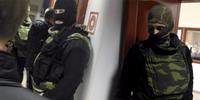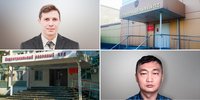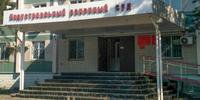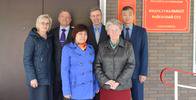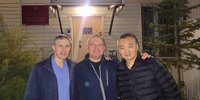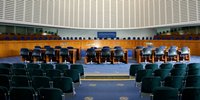The Case of Polevodov and Others in Khabarovsk
Filter
- #
A criminal case has been initiated against 6 residents of Khabarovsk.
- #
Nikolay Polevodov, Stanislav Kim and Vitaliy Zhuk were sent to the pre-trial detention center.
- #
- #
Stanislav Kim is the last to leave the pre-trial detention center, and now all the accused in the case are free with milder measures of restraint.
- #
The case is submitted to the Industrial District Court of Khabarovsk for consideration on the merits.
- #
The case will be considered by judge Vera Alexandrovna Pismennaya. A preliminary hearing is underway.
- #
A preliminary hearing is underway.
- #
The hearings on the merits begin. Due to the absence of one of the defenders, the next court hearings will be held on October 28 (14:30), November 5 (14:30), November 13 (14:30). The public prosecutor is expected to announce the charges and present his evidence to the court on 28 October.
- #
A preliminary hearing of the criminal case is being held in the Industrial District Court of Khabarovsk. The court rejects Stanislav Kim's petition to increase the walking time. The prosecutor reads out the indictment. All six defendants express their disagreement with the charges.
- #
The court examines witnesses. According to the testimony of witness Dmitrieva, a party was held in the café "Alice", which was interrupted by law enforcement agencies 10 minutes after it began. At the friendly meeting, no videos were shown and there was no literature. Witness Samokhina informs the court that the party was not a worship meeting and confirms the testimony of witness Dmitrieva. The prosecutor petitions for the election of a recognizance not to leave as a preventive measure for Nikolai Polevodov. The court grants this request.
- #
- #
The court continues to question prosecution witnesses. O. I. Negrulina, the cashier of the Alice café, informs the court that she did not know that Jehovah's Witnesses had gathered in the café. R. F. Kilimacher tries to use Article 51 of the Constitution of the Russian Federation, but the court does not allow her to do so. The witness reports that the meeting in the café was not religious. She explains that the testimony she gave earlier was taken under psychological pressure. Witness Kilimacher gives explanations of creeds in response to questions from the defendant Kim. The judge wonders if only Jehovah's Witnesses will be saved during God's coming judgment. She is impressed by the witness's response that only God decides, and he does not want anyone to die. D. Sugak is being interrogated. He led an antisocial lifestyle and has not been a Jehovah's Witness since 2016. He gives all testimony relating to a later period based only on his assumptions. Sugak believes that Jehovah's Witnesses will never stop preaching, and in many countries they do so without any legal registration.
- #
- #
The meeting was adjourned.
- #
Hearing.
- #
Vitaliy Zhuk was released from house arrest.
- #
During the court hearings, the questioning of prosecution witnesses continues. Their testimonies suggest that on November 10, 2018, a children's party was held at the Alice café, not a religious meeting. Polevodov and Kim did not make any speeches, did not distribute literature and did not call for committing any illegal actions. Songs were played with a guitar, children recited poems, acted out scenes. Entrance to the hall was free. Witnesses explain that the distribution of cardboard medallions in the shape of sheep with the names of biblical characters at the meeting was not made for the purpose of identifying guests, but was part of an entertainment program.
The interrogated explain that the teachings of Jehovah's Witnesses encourage respect for authority, take care of the family, avoid violence, and take care of their health.
Judge Vera Pismennaya considers inadmissible evidence the testimony of two underage participants in the meeting in the café, since the teacher was not present during their interrogation.
The judge satisfies the prosecutor's request to summon an expert to the court.
The prosecutor begins to announce the materials of the criminal case.
- #
The meeting was postponed.
- #
The meeting was postponed to May 26, 2020.
- #
Only lawyers are present at the court hearing. The judge rejects the defendants' requests to postpone the hearings due to the self-isolation regime in Khabarovsk and supports the prosecutor's request to ensure the appearance of all defendants forcibly.
- #
The court hearing takes place in a small office in which it is impossible to ensure the recommended distance of 1.5 meters.
The judge granted three petitions: lawyer Svetlana Sedova to withdraw from the case, Stanislav Kim to refuse the services of one of the lawyers, and Vitaly Zhuk to postpone the hearing due to his state of health.
- #
The judge grants the motions to withdraw from the case of two more lawyers representing the interests of Stanislav Kim and Vitaliy Zhuk. Public defenders are assigned to them.
Vitaliy Zhuk's repeated petition to postpone the hearing due to his health condition is being considered. Judge Vera Pismennaya declares her dissatisfaction with the delay in the trial and sends a request to the hospital where Zhuk is being treated. Nevertheless, she supports Zhuk's petition and schedules the next hearing for August 3, 2020.
- #
Judge of the Industrial District Court of Khabarovsk Vera Pismennaya returns to the prosecutor the criminal case against Kim, Polevodov, spouses Zhuk, Sedova and 71-year-old Karpushkina. The reasons for this were the violations committed by the consequence, which cannot be eliminated in court. For example, the investigation unfoundedly accuses believers of organizing the activities of a banned organization, while cannot name who, where, when and how coordinated and coordinated these activities; by whom, when, where and what kind of literature was distributed; who, where, when and in what form attracted the members of the organization and how distributed their functions; It is not specified what exactly is expressed in the organization of meetings and much more.
It is noteworthy that the criminal case went to court in July 2019. The court questioned all the witnesses in good faith, but the essence of the accusation was never clarified. (All 162 cases against Jehovah's Witnesses, which, as of August 2020, are being investigated, are being considered or have already been considered by courts in 57 regions of Russia, are marked by such uncertainty.)
The prosecutor will appeal against the court's decision to return the criminal case to the prosecutor's office.
- #
The Khabarovsk Regional Court is considering the appeal of the prosecutor's office against the decision of the Industrial District Court of Khabarovsk dated 08/03/2020 to return the criminal case against 6 believers: Nikolai Polevodov, Stanislav Kim, Vitaly Zhuk, Tatyana Zhuk, Svetlana Sedova, Maya Karpushkina.
The believers and their lawyers ask to uphold the decision of the district court.
Stanislav Kim explains to the judge that conversations with others about God do not require participation in any legal entities and existed long before their appearance.
Nikolay Polevodov reminds the court that the Russian Federation is part of the world community and has pledged not to violate the rights and freedoms of citizens to religion.
The judge asks for comment on the position of the investigation, according to which the believers knew about the ban on legal entities, religious organizations of Jehovah's Witnesses.
"I have never belonged to any legal entity. I just believe what is written in the Bible. I know that God's name is Jehovah. I pray to him, these are my beliefs. I have had them for half my life, and they do not depend in any way on what decisions are made by the court. And this is enshrined in Article 28 of the Constitution of Russia, "Nikolai Polevodov answers.
The hearing was postponed until 12.10.2020. Debates and speeches of the defendants with the last word are planned. On the same day, the judge may decide on the decision.
- #
The appeal hearing continues in the Khabarovsk Regional Court. Judge Irina Koroleva upholds the decision of the lower court to return the criminal case to the prosecutor's office.
- #
The case against Nikolay Polevodov and five other believers is again submitted to the Industrial Court of Khabarovsk. It will be considered by judge Roman Chiskovsky.
- #
In the Industrial District Court of Khabarovsk, a retrial of the case begins.
- #
The court session is held without listeners.
Nikolay Polevodov filed a petition for online broadcasts of the trial, the judge refused.
Due to the absence of witnesses from the prosecution, the prosecutor proposes to change the order of hearings. The process begins with the examination of written evidence.
Transcripts of operational-search activities are read out, at which conversations of believers with each other are recorded. One of the lawyers, who had no previous acquaintance with Jehovah's Witnesses, says she was pleasantly surprised by the respectful communication between people and the absence of obscene language on the audio recording.
- #
The prosecutor continues to read out written evidence. She reads excerpts from memorandums - the results of observations provided by FSB analysts.
- #
The prosecutor requests the disclosure of the affidavit of one of the witnesses because he cannot find him. The defense objects, arguing that the prosecution has not done everything to ensure the appearance of this witness, and his testimony is important for the defense. The judge rejects the motion of the prosecution.
The prosecutor continues to read out the case materials.
- #
The prosecutor shall provide the court with a certificate stating that the witness mentioned earlier is unable to appear in court for health reasons and shall request the reading of his or her affidavit. Lawyers and defendants object, stating that over time, the witness's health may improve and he will be able to speak in court. The judge again rejects the prosecutor's request.
- #
The prosecutor continues to selectively read out the case materials. After the announcement of the characteristics and passport data of the defendants, Tatyana Zhuk draws the court's attention to the fact that the description from the police does not indicate her address and initials.
- #
The court is reviewing a video recording of a religious meeting. The recording is not commented on, such an opportunity will be provided to the defendants at the end of the viewing.
In addition to the defendants and their lawyers, only one listener is allowed into the courtroom.
- #
The court continues to watch videos from the case file
- #
The judge satisfies the petition of Nikolay Polevodov to make an audio recording of the trial.
- #
At the meetings, video recordings of worship services are viewed.
- #
Tatiana Zhuk filed a motion for audio recording, which the judge satisfied.
The court reviews video recordings of worship events that are among the material evidence.
- #
Material evidence is considered, including the book by religious scholar Sergei Ivanenko "About People Who Never Part with the Bible".
- #
The examination of material evidence is ongoing. The judge reads out paragraphs from the book of the religious scholar Ivanenko, which says that the principles of interaction among Jehovah's Witnesses are based on the example of the Christian society of the first century, described in the Bible. He also characterizes the adherents of the doctrine as peaceful citizens who do not pose a threat to society.
Stanislav Kim tries several times to comment on what he read, but the judge interrupts him.
- #
Stanislav Kim submits a motion to refuse the services of a lawyer by appointment. The prosecutor objects. The judge decides that Kim has an appointed defense attorney.
- #
The consideration of material evidence seized from Nikolai Polevodov begins. The judge examines a postcard, Bibles, a book with religious songs, a receipt from a children's goods store about the purchase of furniture, a notebook with drawings of butterflies. The information contained on the title pages of the books is announced, as well as the titles of the songs ("Happy are the merciful", "Let them know us by love") and excerpts from personal notes: "Be honest in everything. God never deceives. Be honest about everything."
Then the material evidence seized from Vitaliy Zhuk is examined. The court examines envelopes, Bibles, and notebooks with personal notes.
- #
The study of material evidence seized from the Zhukov family continues. The court is considering notebooks with handwritten texts about the importance of maintaining a balanced attitude towards alcohol and defeating evil with good, folders with documents dated 2011, a folder with riddles based on biblical texts.
- #
The judge reads out the names of the material evidence in the box. However, it turns out that all of them do not belong to any of the defendants, as they claim.
- #
The court chooses a measure of restraint for Nikolay Polevodov, Stanislav Kim and Vitaliy Zhuk in the form of a written undertaking not to leave the place.
A video from the café "Alice", made in November 2018, which shows only the employees of the café performing their work duties, is examined.
- #
The defense believes that the judge is personally interested in the outcome of the case, and therefore challenges him. The petition notes: "The judge has repeatedly demonstrated an attitude expressing obvious hostility towards the defendants ... The judge allowed statements ... that the sentence handed down after the new [2024] year will be much harsher." It goes on to say: "The presiding officers have repeatedly made it clear that the verdict in the criminal case will be unequivocally guilty ... The court gave instructions to the defendants what to say in their testimony and what not to say."
The prosecutor does not support the petition, the judge rejects it.
- #
The court continues to investigate material evidence, including video recordings of a friendly meeting in a café.
- #
The Khabarovsk Regional Court cancels the decisions of the lower court on the election of a preventive measure for Kim, Polevodov and Zhuk in the form of a written undertaking not to leave.
- #
The defense filed three motions: to recognize the religious examination as inadmissible evidence and to exclude it from the case file; on the recognition of video recordings of the MPA and some documents related to their receipt as illegal and subject to seizure from the case materials; on the return of the criminal case to the prosecutor. The judge rejects all three motions.
The defendants apply for the inclusion of characteristics, health certificates and certificates of lack of information that they have ever been the founders of any legal entities. The court attaches.
The judge also attaches to the case file the decision of the ECHR "Taganrog and other 19 complaints".
- #
Nikolay Polevodov testifies in court. He draws the attention of the audience to the following fact: "The indictment states that I "was aware of the public danger and the unlawful nature of my actions and wished to commit them." This statement is not true, because I realized that my actions did not violate the legislation of the Russian Federation in any way and did not pose any danger to anyone ... I also clearly understood that my lifestyle did not pose any threat to society."
The believer also notes: "In turn, the investigation did not provide a single fact proving that by my way of believing in God, I exposed anyone to any danger, offended someone's feelings or caused any other harm. […] The prosecution itself does not really believe that I can be dangerous to the society in which I am ... Since August 2019, I have not had any preventive measure. But my intent and my goals have not changed at all since then. I am still determined to worship my God, Jehovah, and to show love for my neighbor."
- #
Vitaliy Zhuk gives his testimony: "I am accused of inducing the rupture of family and family relations. I strongly disagree with this. […] While various psychologists and family counselors sometimes suggest that they separate for minor reasons, Jehovah's Witnesses try to keep the family together. My family is almost 30 years old. Other defendants have also been happily married for decades."
The believer continues: "The videos of the worship services, the thoughts that are heard there, clearly show that Jehovah's Witnesses and extremism are completely incompatible concepts. As for the connection with banned organizations and legal entities, this part of the accusation is not confirmed by anything."
- #
Tatiana Zhuk, Stanislav Kim and Svetlana Sedova also testify.
Zhuk tells the court: "Previously, I myself worked as a kindergarten teacher and organized various events there that were both fun and at the same time instructive. And they were attended by both children and adults ... And that was okay. Why is such an event, organized privately among believers, a crime?"
Further, the believer notes that she was not present at the event in the café "Alice", although the case file notes that on that day her "criminal actions were suppressed." She then draws the court's attention to the fact that in the case file her characterization contains the details of another woman with whom she shares the same surname. She says: "I stated this at the court hearing. However, the characteristic was not removed.
Stanislav Kim says: "When I was hired, I notified the HR department that I was one of Jehovah's Witnesses ... The security service conducted a thorough check and did not see anything illegal in my religious beliefs. On the contrary, during my service, I was repeatedly awarded with diplomas and gratitude, received incentives that are recorded in my work book. This shows that I am useful to society and do not pose any threat."
Svetlana Sedova explains: "The indictment states that I 'used my apartment for the purposes of the LRO (local religious organization) to hold meetings." In the materials considered during the judicial investigation, there is no evidence that the apartment was used by any legal entity. This is not confirmed by the testimony of witnesses. The Bible teaches us to be hospitable, so I provided my apartment to gather with friends. […] It is not illegal to invite guests to your home. Worshiping God with friends is also not forbidden by law."
- #
The prosecutor requests punishment for the defendants: Nikolai Polevodov, Vitaliy Zhuk and Stanislav Kim to 9 years of imprisonment in a general regime colony with restriction of liberty for 1 year and 6 months and a ban on engaging in public and religious activities for 8 years; Tatyana Zhuk, Svetlana Sedova and Maya Karpushkina were sentenced to 5 years of suspended imprisonment with a probationary period of 5 years and restriction of liberty for 11 months.
- #
The defendants make their final statements.
The last word of the defendant Tatyana Zhuk in Khabarovsk The last word of the defendant Vitaly Zhuk in Khabarovsk The last word of the defendant Stanislav Kim in Khabarovsk The last word of the defendant Maya Karpushkina in Khabarovsk The last word of the defendant Nikolai Polevodov in Khabarovsk The last word of the defendant Svetlana Sedova in Khabarovsk - #
- #
Vitaliy Zhuk, Nikolay Polevodov and Stanislav Kim are in the Khabarovsk pre-trial detention center. They can receive letters.
Nikolay and Vitaliy have Bibles. Stanislav is waiting for the Bible to be returned to him from the inspection. Believers feel satisfactory and maintain a positive attitude while waiting for an appeal. They are allowed to visit their relatives.
- #
Vitaliy Zhuk, Nikolay Polevodov and Stanislav Kim are still in pre-trial detention. All three have a good relationship with their cellmates. So, the men who are kept with Nikolai try not to swear and smoke near the hood.
Believers receive numerous letters of support. One day, 18 pieces were brought to Vitaliy at once.
- #
Stanislav Kim, Vitaliy Zhuk and Nikolay Polevodov feel fine. All three have the opportunity to regularly call and see their wives on short-term visits. They also receive letters and parcels from their relatives.
Stanislav has not yet received his personal copy of the Bible, which is being checked.
- #
A court hearing of the Appellate Board for Criminal Cases of the Khabarovsk Regional Court is underway. Zhuk, Polevodov and Kim are present via video conferencing. About 30 people come to support them, of which 15 are allowed into the courtroom. The presiding judge briefly reads out the case file. The arguments of the parties are postponed until October 10, 2024.
- #
- #
